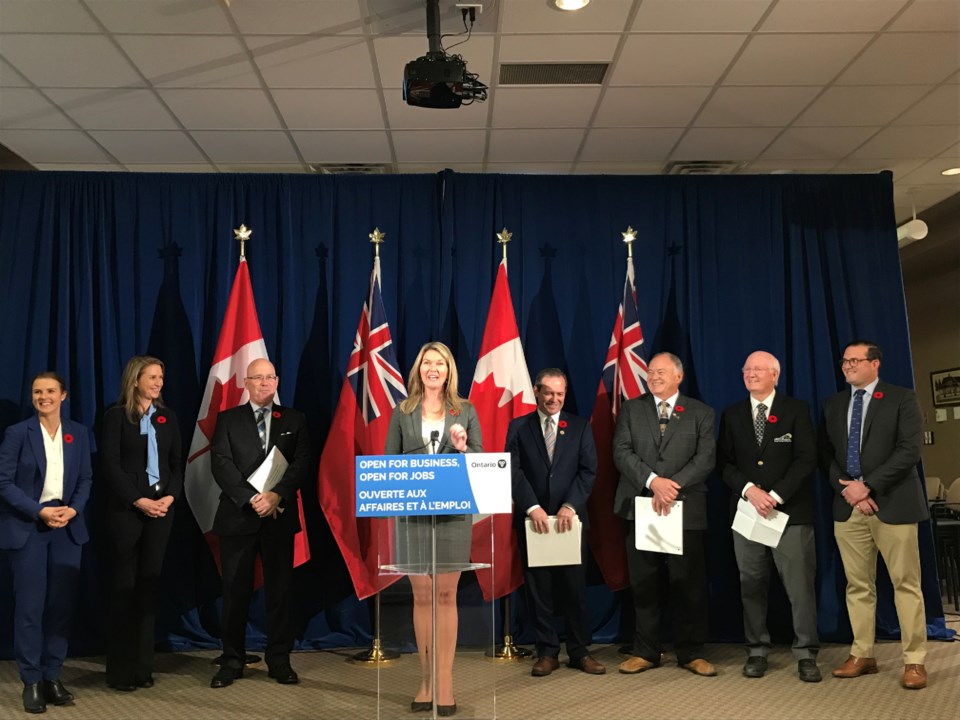NEWS RELEASE
JILL DUNLOP, MPP SIMCOE NORTH
************************
The Ontario government is providing up to $1.05 billion in combined federal-provincial funding through the new COVID-19 Resilience infrastructure stream to build or renovate health and safety-related projects in long-term care, education and municipalities.
The funding is part of the federal government's Investing in Canada Infrastructure Program and reinforces the commitment of both the federal and provincial governments to protect the health and well-being of individuals and families during the pandemic.
Details were provided Friday by Premier Doug Ford, Laurie Scott, Minister of Infrastructure, Stephen Lecce, Minister of Education, Steve Clark, Minister of Municipal Affairs and Housing, and Merrilee Fullerton, Minister of Long-Term Care.
Total eligible allocations in Simcoe North are as follows:
- Orillia - $612,077
- Midland - $286,325
- Penetanguishene - $162,274
- Oro-Medonte - $100,000
- Ramara - $100,000
- Severn - $100,000
- Tay - $177,315
- Tiny - $100,000
“This funding will be of great benefit to the City of Orillia, Town of Midland, Townships of Penetanguishene, Oro-Medonte, Ramara, Severn, Tay and Tiny at a challenging time for budgetary planning,” said Jill Dunlop, MPP for Simcoe North. “I look forward to following the plans of each community and how they will use this funding to support key infrastructure priorities across the riding.”
Eligible projects under the COVID-19 Resilience stream will fall under four main categories:
- Community, recreation, health and education renovations (e.g. retrofits, repairs or upgrades to long-term care homes, publicly funded schools and co-located childcare centre facilities, recreation centres or shelters);
- COVID-19 response infrastructure (e.g. heating, ventilation, air-conditioning, new builds or renovations to enable physical distancing);
- Active transportation (e.g. parks, trails); and
- Disaster mitigation, adaptation, or remediation (e.g. flood mitigation).
"Getting shovels in the ground on new infrastructure projects across the province will be a critical component of our path to long-term economic recovery," said Premier Ford. "Not only will this investment help communities build the necessary infrastructure to keep Ontarians safe and healthy, but these projects will create hundreds of local construction jobs and support local businesses and suppliers. It's a win-win for the home team."
The COVID-19 Resilience stream will deliver:
- Up to $700 million for education-related projects to be nominated and administered by the Ministry of Education;
- An allocation-based program that will deliver $250 million to municipalities to address critical local infrastructure needs, including $6.5 million that will be directed toward Indigenous and on-reserve education, through the Ministry of Infrastructure in collaboration with the Ministries of Education and Indigenous Affairs; and
- Up to $100 million for long-term care projects to be identified and administered by the Ministry of Long-Term Care.
Eligible projects must begin by Sept. 30, 2021, and be completed by Dec. 31, 2021. Additional details about the COVID-19 Resilience stream and intake opening dates will be available in the days and weeks ahead.
"Ontario recognizes the flexibility the new COVID-19 Resilience stream will provide to communities and organizations," said Minister Scott. "We're making it possible for communities to get shovel-ready projects underway sooner so they can kick-start their local economies."
Quick Facts
The Investing in Canada Infrastructure Program (ICIP) is a 10-year, $30-billion federal, provincial and municipal program that provides funding to improve public transit; community, culture and recreation; green; and rural and northern community infrastructure. Ontario is investing $10.2 billion in this program.
To date, Ontario has nominated 760 projects to the federal government under ICIP, of which more than 390 have been approved.
The federal COVID-19 Resilience stream has been adapted from ICIP to respond to the impacts of COVID-19. This ICIP stream, delivered through bilateral agreements with provinces and territories, has been designed to help add flexibilities, expand project eligibility and accelerate approvals.
The COVID-19 Resilience stream will be 80 per cent cost-shared by the federal government and 20 per cent cost-shared by the Province for public infrastructure ― further reinforcing the support being provided to build and renovate health and safety-related projects in long-term care, education and municipalities.
The Ministry of Education is also investing $1.4 billion in renewal funding, which continues to meet the funding level recommended by the Auditor General of Ontario to preserve the condition of Ontario’s school facilities.
************************



